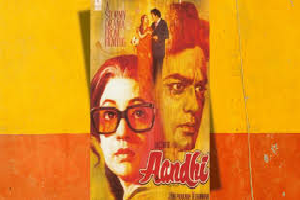13

50 years since ‘Aandhi’ was banned
Amitabh Srivastava
New Delhi | Friday | 13 June 2025
Everyone will remind us of June 25,1975 for the imposition of emergency, this time more than ever because it’s been exactly 50 years since emergency was clamped by late Indira Gandhi after the Sampoorna Kranti movement of Jai Prakash Narayan in Bihar turned into a political movement to remove the then Prime Minister after an electoral verdict in Allahabad. We are told the Modi government may call a special session of Parliament this time to rub the salt in.
Incidentally, the anger against the emergency is more among those who had not witnessed it rather than among those like this writer who witnessed it live and lived long enough to see the current regime in power since 2014.
But this article is not about putting politicians in jail on charges of sedition but about a much more senseless and ‘sinister’ crime(as a student of literature), banning the J Om Prakash work of art ‘Aandhi’ which I remember was released on February 14,1975 and banned five months later because word was spread that the main character Aarti Devi(Suchitra Sen)resembled Indira Gandhi who is shown in a negative light (smoking and drinking?).
I am tempted to write this piece because I had the chance to watch this magical, lyrical work yet again two days back as I was scrolling though U-Tube on a lazy hot afternoon.
For me and my wife the story may have had resemblances to a real time character (Indira Gandhi) but that was history.
We were watching it for its sheer poetry, and I am not just talking about the immortal lyrics composed by Gulzar and music by SD Burman.
Of course, the film’s numbers are unforgettable. At the age of 25 when I had watched Aandhi on screen we were so ‘bewitched’ for lack of a better term, that when the film was banned me and my friend went to music shops just to listen to Tum Aa Gaye Ho Noor Aa Gaya, Is Mod Se Jate Hain, and Tere Bina Zindagi Se because we did not have a record player at home.
After a gap of 50 years as I switched on the TV I was immediately transported back to the magic world of Gulzar Saheb.Every dialogue, every expression, every movement of the eyes, the lips, every gesture of the lead characters Sanjeev Kumar and Suchitra Sen is simply mesmerising.
It was like a fairy tale where I was willing to be an Alice, all set to get lost in the magical world directed by lyricist director Gulzar who just received the Jnanpith Award for the year 2024 and created by J Om Prakash the producer of the film. How dare anyone even think of banning a work of art like ‘Aandhi’?
Incidentally, an article I was reading recently says that when the film was all set for release Indira Gandhi had asked her I and B Minister I k Gujral (does anyone know the current I and B Minister’s name) and two other officers to check if the film was worth being seen and being a poet and a man of taste Gujral had okayed it.
So what, if a powerful woman and a politician at that, is seen smoking in a scene. Can’t imagine them without a smoke or a drink today. But as just out of college students of literature at that age, and not being journalist then what stood out for us were those small moments of sheer joy
The first meeting of Sanjeev Kumar and Suchitra Sen in the Hotel (in the film) where he works, for several years after their separation, sets off the spark.
A graceful lady with grey streaks of hair she is standing at the door and he is so perplexed to see her there without announcement that he forgets to welcome her in and she asks him quietly, ”Andar aane ko Nahi Kahoge.”
And the magic has just begun, thanks to the direction of Gulzar. She looks around the room, at the ceiling and asks “Yeh Muchein kyoon Rakh Leen.” Sanjeev Kumar is as surprised as us and pats his moustache saying, “Bus aivain.”
As the film rolls back and forth from the past to the present we get a glimpse of what life could have been if her ambitions added and abetted by her father, did not take her to a different career choice and life style.
When deciding the name of a daughter he suggests Manorama but Aarti says it reminds her of someone very fatty (the audience grins) so he says let’s call her Man. She says it’s too small and he playfully suggests “Let’s say it twice Man Man.”
That’s the subtle humour that runs through their initial married life promising a life that would be full of poetry (he is a poet) and intelligent banter.
But that was not to be.
With a father pushing her into politics at the cost of leaving a loving and caring but self-respecting husband and even her child (that was unpardonable at that time) the parting had to come giving the critics a chance to make it a ditto story of Indira Gandhi for hard-headed critics in her own party and of course the saffron brigade.
There is sufficient and unsparing coverage of her political life as well.
Her chief political advisor (Om Prakash) tells her to sleep on ‘Gaddas’ on the floor and not on the bed at least till the elections are over.
Her reaction to a stone hitting her head is a political masterstroke.
As her party leaders rush to call for a doctor Om Prakash tells them,” Bhaiye doctor baad mein ayega pahle media ko bulao.”
This works for her. And so does the film. We know that the film was banned in 1975 after emergency was imposed but film historians tell us now that when the film was released initially on February 14,1975 the public response was hardly anything to go by.
Reasons were quite obvious. Sanjeev Kumar the classless actor was not considered capable of carrying a film solely on his shoulders and no one knew Suchitra Sen (This was only her third film in Hindi, others being Devdas and Bambai Ka Babu).
What marks the film apart is not its political overtones and implications which were over played by vested interests but a story that talks of mature love between married couple who have a grown up daughter living in a hostel.
There have been many such family films later on including Rajesh Khanna and ‘Baghban’ starring Amitabh Bachchan and Hema Malini but Aandhi is different.
It asserts the right of married couples with white hair to indulge in romantic outings and caring for each other like any other couple just fallen in love.
Melodies like the following say it all:
“Tum aa Gaye Ho Noor Aa Gaya Hai
Nahi to Chiragon se Lau Ja Rahi Thi
Keene Ki Tumse Wajah Mil Gayee Hai
Badi Bewjah Zindagi Ja Rahi Thee”





















































































































































































































































































































































































































































































































































































































































































































































































































































































































































































































































































































































































































































































































































































































































































































































































































































































